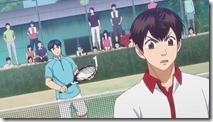 |
 |
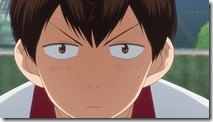 |
Every time we’re tempted to forget the title of this series, Baby Steps reminds us.
Curses to three-minute recaps. They’re the bane of the existence of sports anime fans, though Baby Steps has generally been good about avoiding them (unlike, say, Diamond no Ace). I guess they give us something to criticize if nothing else, and Baby Steps has been mighty stingy in that respect. We’ve reached the most crucial match of the series so with in pretty much unassailable fashion apart from the animation, and even that’s been pretty decent in the clutch.
I would imagine that of all the opponents one might have to face in tennis, Nabae would be about the most unnerving for someone like Ei-chan. If you’re Maruo, Nabae-kun is basically a better version of you – he’s been you longer than you have. That’s an oversimplification of course, but that’s surely what it must feel like. For really the first time in his brief career, Ei-chan is facing an opponent who can match him analytically – someone who understands the calculus Ei-chan uses to break down the game and can anticipate where it’s going to take Ei-chan next.
None of that would matter if Nabae didn’t have the game to back it up, but he does. He’s bigger and stronger than Ei-chan too, and understands his body better based on his years of experience testing it. The thing is, though, that Ei-chan has the game too – and that’s clear when one (such as Ei-chan himself) compares his performance in this match against the first time the two boys played. That Ei-chan had some idea of what he needed to do to have a chance against Nabae – be aggressive and take risks – but he lacked the physical strength and shotmaking to back it up.
Well, that situation has changed, and the first four games of the match bear that out. Yes, they’re an aberration – Maruo-kun is in “the zone”. But the zone is a real thing in sports, and because this is Baby Steps it’s not some kind of Shounen Jump superpower but a fragile state of mind that can lift your game to new heights – for a while. Maruo-kun in the zone is a player who trusts his instincts and reacts to what’s happening in front of him, and one whose instincts are good enough to make that effective. The instinctive and the analytical are not opposites in sports – they’re intimately connected. And it’s Maruo’s diligent analysis over his tennis career that has honed his instincts into the formidable weapon they are now.
Still – unless one is a Federer or Djokovic they can’t stay in the zone for an entire match (and even for them it’s exceedingly rare). And Nabae-kun is not a player who will panic when faced with a blitz of brilliance he knows isn’t sustainable. Nabae does what smart players do – he digs in and weathers the storm, waiting for Ei-chan’s level to come down a bit. Which it does, when Ei-chan starts thinking about the overall situation in the match. By that point he’s already up two breaks, but there’s an immediate sea-change when Maruo’s thoughts begin to wander even a little.
I think this next transition is the best part of the episode, and a real example of the subtle brilliance of Baby Steps’ writing. Ei-chan digs in, realizing what’s happening, and falls back on the process he normally uses in a match. He hits three shots in a row to Nabae’s backhand corner – a topspin, a slice, and a flat shot – to win a point. It’s cheeky, really, and classic Ei-chan tennis. But it’s classic Ei-chan tennis to the point where Nabae immediately recognizes that he’s now facing the player he expected to face when the match started. And that’s someone he knows, and someone whose game – while vexing and high-level – is something he can deal with. Maybe Nabae-kun is the only opponent who could read the moment this way and turn it to his advantage, but then he is the #1 junior boy in Japan.
This represents a new challenge for Ei-chan, and a new opportunity to level up. Nabae breaks him and rattles off three games in a row, and worse, he’s focused laser-like on the essence of Maruo’s game, the change-of-pace. One of the fundamental truths of tennis is that more pace isn’ always a good thing – some guys love to have that pace, because it makes it easier for them to generate pace in return. Ei-Chan’s current game is built around using the hard flat as his finishing move after a variety of spins, but Nabae is eating that pattern for lunch. Does Ei-chan abandon it, relying on topspin and slice? But if he does that, he abandons his aggressiveness and effectively becomes a passive player.
Because Ei-chan is who he is – and because Aoi-koochi gave him some timely advice – he chooses another path. He ups the risk level and decides to go for the lines instead of relying on his gridwork approach, and tries to mine his first serve for as many free points as possible. As I’ve noted before, in tennis guys tend to do one of two things under pressure – play it safe, or go bigger. And it’s the latter group who tend to be the elite players. This is an enormously risky strategy for Ei-chan, because it’s leaving his comfort zone and because he doesn’t yet have the raw power to make this style a natural fit. But an opponent like Nabae-kun is the sort who forces difficult choices – especially when one’s own game is patterned after his. It’s yet another crucible Ei-chan has to face if he’s going to be a serious tennis player.
 |
 |
 |
 |
 |
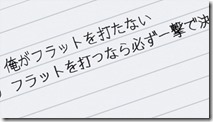 |
 |
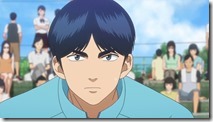 |
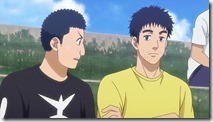 |
 |
 |
 |
 |
 |
 |


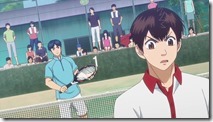
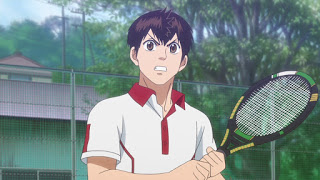
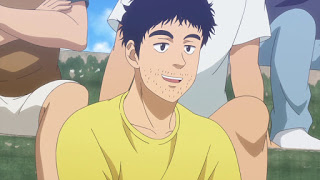
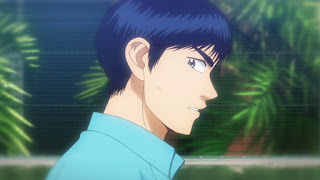
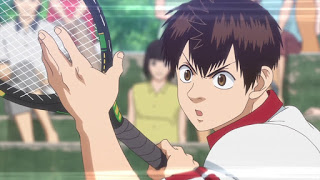
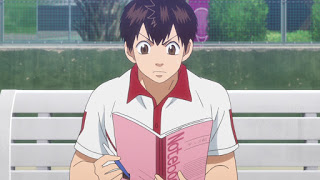
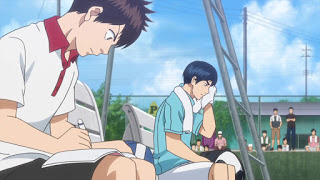
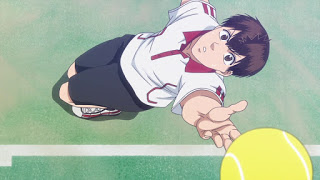
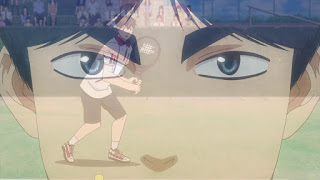
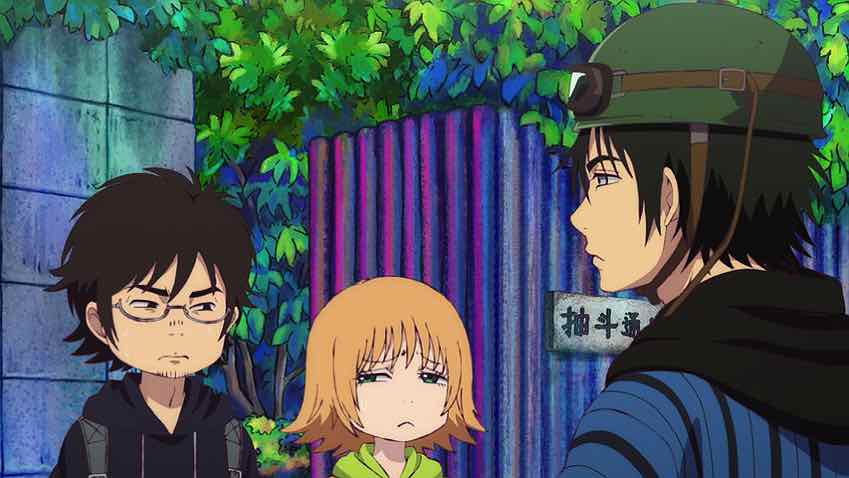
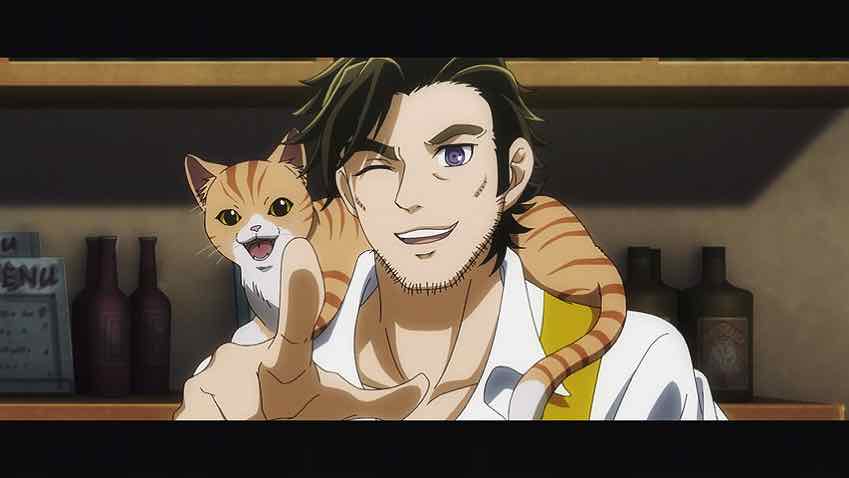
melodic thoughts
September 7, 2015 at 9:47 amThis has got to be the best matchups in Baby Steps thus far. I remember you said that the matches get better throughout the series and I have to agree with that now.
I can't help comparing but DnA has to learn from Baby Steps in terms of the good but never intrusive coach. I'm only saying this cos as much as I love DnA it gets on my nerves sometimes. Loving how Aoi-kantoku is approachable and observant but he never tries to teach Ei-chan his way of tennis.
I wonder if there is a way Ei-chan can stay in the zone, yet still keep his analytical mind in the game. I remember the episode mentioned that being in the zone means that Ei-chan instinctually perceives the best shot, but that will come at the expense of a psychological battle as one would not take risky and unpredictable shots to outwit the opponent? Sorry if I could not catch the details of Tennis as I have almost never watched or played the sport prior to this show.
Jay Psi
September 7, 2015 at 10:11 amA quick note that probably wasn't worth expanding on for your review but that I found exemplary of the nature of these two players. When Nabae won the point on the bounce of the net (paraphrasing):
Nabae: "Even if it's a lucky point, it's a big deal (to win a point)"
Maruo: "That was just bad luck. I won't dwell on it"
Here we see two players with extraordinarily similar attitudes to their tennis taking the same event in the manner that best suits their situations in the match – Nabae needed some measure of a victory to get his game going, so he'll take the point however it comes and be grateful. Maruo doesn't need the potential distraction to take him out of his game, so he calmly dismisses the point as one lost to chance.
It shows how well tuned both players are to their goals (both within and outside of matches) and the level of detail Baby Steps goes to to explore the minutiae of elite sports. It's a shame there probably won't be much more of this, unless you have good news on that front GE?
admin
September 7, 2015 at 2:44 pmI know no more than anyone else. If you're looking for straws to grasp the last manga volume was the best seller so far.
Truman
September 13, 2015 at 9:37 amAny word on if this show will be continuing into fall?
admin
September 13, 2015 at 4:37 pmExtremely unlikely. Even if it gets another season it probably won't be till Spring.